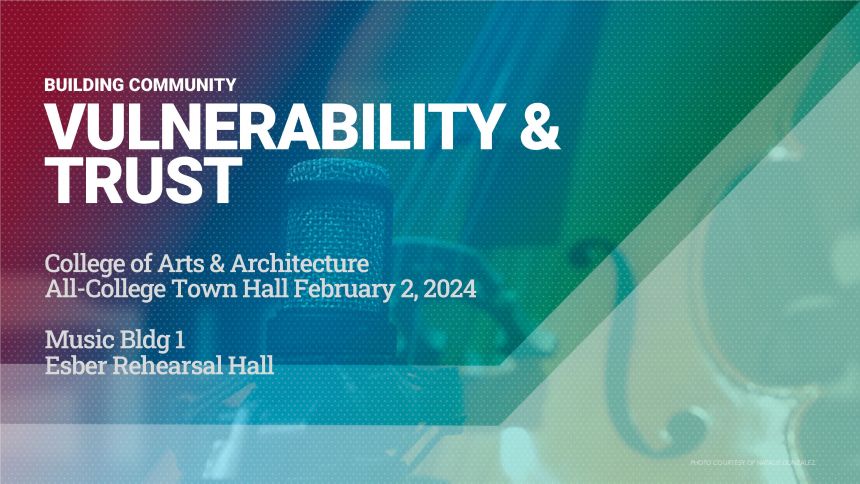
Office of Access and Equity
Office of Access and Equity
The Office of Access and Equity (OAE) supports the College of Arts and Architecture in establishing a culture of anti-racism and anti-oppression that embraces individual identities, fosters inclusion, broadly promotes equity and a culture of belonging for students, faculty and staff.
OAE Resources
The Office of Access and Equity is actively compiling a list of resources within the University and the community at large that provide critical information related to navigating, understanding, and engaging with the broad topics of diversity, equity, access, inclusion, community, anti-racism, and belonging. This list already is deep and powerful – exploring topics such as antiracist terms, white supremacy and privilege, supporting people of color and other marginalized groups, and education for racial equity – and the list will continue to expand.
Courses for Faculty and Staff in Cultural Competencies and DEIB
Offered by the Center for Engineering Outreach and Inclusion through their Inclusive Leadership in Equity, Allyship, and Diversity (ILEAD) program, these courses include Foundations of Diversity, Equity & Inclusion and sixteen others such as Understanding Microaggressions, Implicit Bias, White Privilege, Acknowledgement of Land, and other subjects you can add to your DEIB knowledge toolkit. These courses are open to all faculty and staff.
The labor of advancing our college’s DEIB goals is the responsibility of all of us. Picking just one workshop this semester to advance your own education makes a meaningful contribution to our collection learning.
Contact
Office of Access and Equity
124 Borland Building
University Park, PA 16802
814-865-2591
Folayemi Wilson
Associate Dean for Access and Equity; Professor of Art
Wanjiru Kareithi
Postdoctoral Scholar; College of Arts and Architecture
Jen Curry Morgan
Administrative Assistant
Connect
Affiliates

“Artists are here to disturb the peace.”
– James Baldwin, Conversations with James Baldwin (1989)
5 simple things you can do NOW to foster equity, inclusion and belonging
Use Pronouns.
Respect individual preferences by sharing and allow others to acknowledge individual identities when introducing themselves in the classroom, online, and at events. Include your preferred pronouns in prominent places like email signatures, on zoom, name badges and business cards. Penn State’s Center for Sexual and Gender Diversity offers suggested formats for email signatures, suggested language to address pronouns in syllabi and handbooks, as well as other resources, like gender diversity terminology.
Find authentic ways to acknowledge the land.
Penn State developed a land acknowledgement in collaboration with the Indigenous Peoples Student Association and the Indigenous Faculty and Staff Alliance. Start by learning about the Morrill Land Grant Act of 1862 – a part of the great land grab that funded the establishment of agricultural-based colleges such as Penn State with expropriated Indigenous lands. Think of a land acknowledgement as a starting point to learn more about Indigenous America.
Provide captioning, accommodations and be aware of ableist language.
Provide opportunities for all bodies and abilities to participate in your programs, classes, and events remotely or in-person, and to access your communications. There are resources for those that need accommodations and those wanting to provide them including best practices for accessible instruction. Unconscious bias can show up in the words we use. Become aware of common, ableist language you might not know you are using.
Offer space.
Significant and traumatic events are happening at an alarming rate and becoming commonplace. Let’s not numb our humanity. Provide time in the classroom, at meetings, and events to process and check in about where people are at. If individuals needs more support, Penn State resources for students, faculty and staff are available.
Commit to learning what you don’t know.
Various resources, panels, lectures, and reading lists are readily available from our library, university, and through simple online searches. Educate yourself about anti-racism, other forms of oppression, privilege, and how to be more inclusive and support a culture of belonging. Self-education, increasing your awareness of various lived experiences, and adopting inclusive practices is a process that starts where you are.
Develop | Strengthen | Contribute | Transform
OAE sponsored workshops
Faculty and staff are invited to take advantage of workshops organized by the Office of Access & Equity. These workshops are designed to develop and strengthen individual competencies that can contribute collectively to transforming “…our curricula, values, standards, ideal, policies, and practices,” to ensure greater equity, diversity, inclusion and belonging throughout the College. Various workshops will be offered during the academic year.

A&A Community Coming Together
OAE Town Halls

Building Vulnerability & Trust
This year’s annual OAE Town Hall theme focused on strengthening trust in our college community through developing a collective capacity for vulnerability.
Learn more about this town hallPrevious Town Halls
2023 Town Hall
What Does Change Look Like?
In February 2023, Associate Dean Wilson summarized the work of her office and shared the context for how she is viewing our current educational environment. The Town Hall included a panel of administrators, directors, faculty and student representation that shared what change looks like in their respective areas.
The A&A community had the opportunity to place themselves on a continuum of individual change, and to discuss possible next steps in moving towards personal activism and a better understanding of equity and inclusion.
2022 Listening Tour Report
Imagining a culture of equity and belonging: where do we go from here?
The Fall OAE listening tour initiated a period of listening as research about the culture of the College of Arts and Architecture and individual concerns regarding equity, diversity, inclusion and belonging. Associate Dean Wilson spoke with more than 50 representatives of the college, including students, staff, faculty, college leadership and administration.
This report provides significant details regarding the listening tour process and data analysis, as well as key recommendations and goals. Moreover the report highlights other equity issues and actions impacting the college.